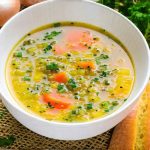Liver-Friendly Cooking with Whole Foods
The liver is an incredibly resilient organ, often taking on a heavy workload in detoxifying our bodies and processing nutrients. However, modern diets rich in processed foods, sugar, and unhealthy fats can place significant stress on this vital organ. Supporting liver health through dietary choices isn’t about restrictive dieting; it’s about embracing nourishing whole foods that minimize the burden on the liver and promote its natural functions. Many people think “liver-friendly” means bland or tasteless, but quite the opposite is true! Flavorful, satisfying meals can simultaneously delight your palate and support this essential organ – it’s all in understanding which foods work best and how to prepare them thoughtfully.
This article will explore practical tips for incorporating liver-supportive recipes into your everyday cooking routine, focusing on whole food ingredients that are easy to find and prepare. We’ll move beyond generalized advice and delve into specific food choices, preparation methods, and recipe ideas designed to minimize stress on the liver and maximize its health. Remember, dietary adjustments should always be considered as part of a holistic lifestyle approach, alongside adequate hydration, regular exercise, and mindful stress management. This is about building sustainable habits that promote long-term wellbeing, not just quick fixes or fleeting trends.
Prioritizing Liver-Supportive Foods
A liver-friendly diet centers around foods that are easily digested and don’t require excessive processing by the liver. Focusing on whole, unprocessed foods is paramount. These include a wide variety of colorful fruits and vegetables, lean proteins, healthy fats, and complex carbohydrates. Specifically, cruciferous vegetables like broccoli, cauliflower, and Brussels sprouts contain compounds that assist in detoxification processes. Leafy greens such as spinach and kale are also excellent choices, providing essential vitamins and antioxidants. Furthermore, incorporating foods known to support bile production – crucial for fat digestion and toxin elimination – like artichokes and beets can be incredibly beneficial.
It’s equally important to limit foods that place a heavy burden on the liver. These include highly processed foods, sugary drinks, excessive alcohol consumption, and large amounts of saturated and trans fats. While occasional treats are perfectly acceptable, making these items less central to your diet reduces stress on the organ responsible for processing them. Consider reducing intake of refined carbohydrates like white bread and pasta, opting instead for whole grain alternatives or complex carbohydrate sources such as sweet potatoes and quinoa. Remember that hydration is also key; adequate water intake supports all liver functions and aids in toxin removal.
Finally, incorporating foods with anti-inflammatory properties can further support liver health. Chronic inflammation can contribute to liver damage, so including ingredients like turmeric, ginger, and berries into your diet may offer protective benefits. These spices and fruits are not only delicious but also packed with compounds that help combat oxidative stress and promote overall wellbeing. A diverse and colorful plate is often a sign of a liver-supportive meal!
Incorporating Specific Foods & Herbs
One powerful addition to a liver-friendly kitchen is milk thistle. While not a food in the traditional sense, milk thistle is an herb well-known for its potential liver-protective properties. It contains silymarin, which may help regenerate liver cells and protect against toxins. Milk thistle can be taken as a supplement or incorporated into herbal teas – consult with a healthcare professional before adding supplements to your routine. Beyond herbs, consider the benefits of beetroot. Beets are rich in betaine, a compound that supports liver detoxification and improves bile flow. Enjoy them roasted, juiced, or added to salads for a vibrant and nutritious boost.
Another often overlooked food is garlic. Garlic contains sulfur compounds which activate liver enzymes responsible for flushing out toxins. A small amount of garlic incorporated into your cooking – sautéed in olive oil, minced into sauces, or added to soups – can contribute to overall liver health. Similarly, lemons and limes are excellent choices due to their high vitamin C content and ability to stimulate bile production. Start your day with warm lemon water or add a squeeze of lime to salads and fish dishes for a refreshing and supportive addition.
Don’t underestimate the power of healthy fats. While it might seem counterintuitive given concerns about fatty liver disease, incorporating sources like avocados, olive oil, and flaxseeds provides essential nutrients and supports cell function. Avoid trans fats and limit saturated fats, but don’t be afraid to embrace moderate amounts of healthy fats in your diet – they are crucial for overall health and can actually aid in detoxification processes when consumed appropriately.
Gentle Cooking Methods & Preparation
How you prepare your food is just as important as what you eat. Harsh cooking methods like deep frying or prolonged high-heat grilling can create harmful compounds that the liver needs to process, increasing its workload. Instead, focus on gentler methods such as steaming, poaching, baking, and sautéing with minimal oil. Steaming vegetables preserves their nutrients while making them easy to digest. Baking fish or chicken at moderate temperatures maintains moisture and avoids excessive fat absorption.
When using oils, opt for olive oil, avocado oil, or coconut oil – these contain healthy fats that support liver function. Avoid highly processed vegetable oils like soybean oil and corn oil as they are often inflammatory and can contribute to oxidative stress. Before cooking cruciferous vegetables, consider lightly steaming them first. This helps break down some of the compounds that can cause gas and bloating, making them easier to digest. Proper food preparation isn’t just about taste; it’s about minimizing the burden on your liver during digestion.
Finally, portion control is key. Overeating any food, even healthy ones, forces the liver to work harder. Pay attention to your body’s hunger and fullness cues, and aim for moderate portions at each meal. Eating slowly and mindfully allows you to savor your food and prevent overconsumption. This mindful approach supports not only liver health but also overall digestive wellbeing.
Simple Recipe Ideas
Here are a few simple recipe ideas incorporating liver-friendly ingredients:
- Turmeric Roasted Vegetables: Toss broccoli, cauliflower, and carrots with olive oil, turmeric powder, ginger, and black pepper. Roast at 375°F (190°C) for 20-25 minutes.
- Lemon Herb Baked Salmon: Season salmon fillets with lemon juice, dill, parsley, and a drizzle of olive oil. Bake at 350°F (175°C) for 12-15 minutes. Serve with steamed spinach.
- Beetroot & Apple Salad: Combine grated beetroot, diced apple, walnuts, and a light vinaigrette made with olive oil and lemon juice. Add a sprinkle of fresh parsley.
These recipes are just starting points – feel free to experiment with different herbs, spices, and vegetables to create meals that you enjoy and that support your liver health! Remember consistency is key when making dietary changes; small, sustainable adjustments over time will yield the most significant long-term benefits.


















